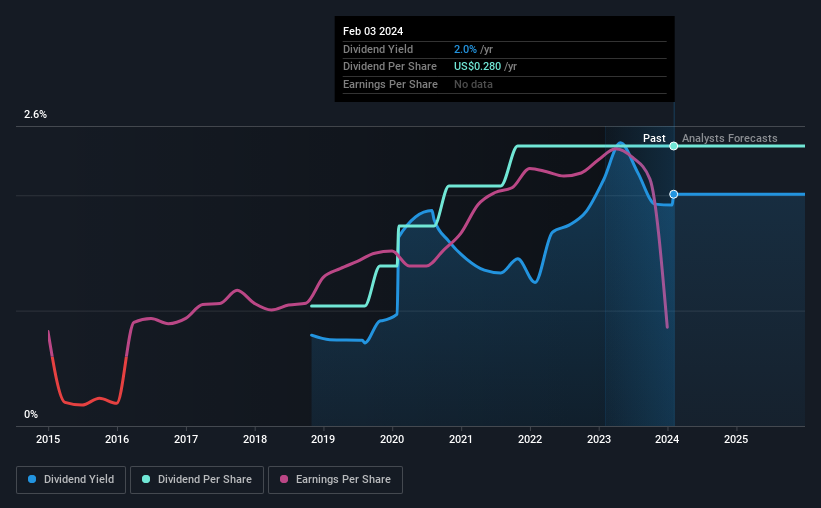Dividend Investors: Don't Be Too Quick To Buy First Northwest Bancorp (NASDAQ:FNWB) For Its Upcoming Dividend
First Northwest Bancorp (NASDAQ:FNWB) stock is about to trade ex-dividend in four days. The ex-dividend date is one business day before a company's record date, which is the date on which the company determines which shareholders are entitled to receive a dividend. The ex-dividend date is of consequence because whenever a stock is bought or sold, the trade takes at least two business day to settle. This means that investors who purchase First Northwest Bancorp's shares on or after the 8th of February will not receive the dividend, which will be paid on the 23rd of February.
The company's next dividend payment will be US$0.07 per share. Last year, in total, the company distributed US$0.28 to shareholders. Based on the last year's worth of payments, First Northwest Bancorp stock has a trailing yield of around 2.0% on the current share price of US$13.94. Dividends are a major contributor to investment returns for long term holders, but only if the dividend continues to be paid. As a result, readers should always check whether First Northwest Bancorp has been able to grow its dividends, or if the dividend might be cut.
See our latest analysis for First Northwest Bancorp
Dividends are typically paid from company earnings. If a company pays more in dividends than it earned in profit, then the dividend could be unsustainable. First Northwest Bancorp paid out 109% of its earnings, which is more than we're comfortable with, unless there are mitigating circumstances.
When a company pays out a dividend that is not well covered by profits, the dividend is generally seen as more vulnerable to being cut.
Click here to see how much of its profit First Northwest Bancorp paid out over the last 12 months.
Have Earnings And Dividends Been Growing?
When earnings decline, dividend companies become much harder to analyse and own safely. If earnings decline and the company is forced to cut its dividend, investors could watch the value of their investment go up in smoke. First Northwest Bancorp's earnings per share have fallen at approximately 18% a year over the previous five years. When earnings per share fall, the maximum amount of dividends that can be paid also falls.
The main way most investors will assess a company's dividend prospects is by checking the historical rate of dividend growth. Since the start of our data, five years ago, First Northwest Bancorp has lifted its dividend by approximately 18% a year on average. That's intriguing, but the combination of growing dividends despite declining earnings can typically only be achieved by paying out a larger percentage of profits. First Northwest Bancorp is already paying out a high percentage of its income, so without earnings growth, we're doubtful of whether this dividend will grow much in the future.
Final Takeaway
Has First Northwest Bancorp got what it takes to maintain its dividend payments? Not only are earnings per share shrinking, but First Northwest Bancorp is paying out a disconcertingly high percentage of its profit as dividends. It's not that we hate the business, but we feel that these characeristics are not desirable for investors seeking a reliable dividend stock to own for the long term. This is not an overtly appealing combination of characteristics, and we're just not that interested in this company's dividend.
Although, if you're still interested in First Northwest Bancorp and want to know more, you'll find it very useful to know what risks this stock faces. For example, we've found 3 warning signs for First Northwest Bancorp that we recommend you consider before investing in the business.
If you're in the market for strong dividend payers, we recommend checking our selection of top dividend stocks.
Have feedback on this article? Concerned about the content? Get in touch with us directly. Alternatively, email editorial-team (at) simplywallst.com.
This article by Simply Wall St is general in nature. We provide commentary based on historical data and analyst forecasts only using an unbiased methodology and our articles are not intended to be financial advice. It does not constitute a recommendation to buy or sell any stock, and does not take account of your objectives, or your financial situation. We aim to bring you long-term focused analysis driven by fundamental data. Note that our analysis may not factor in the latest price-sensitive company announcements or qualitative material. Simply Wall St has no position in any stocks mentioned.

